There are plenty of wonderful skincare ingredients that “feed” your skin from the outside in. The best ones nourish your skin and keep it looking youthful all by themselves. But their effects can be magnified if you also regularly consume foods that boost skin health.
Certain foods are packed with the very nutrients your skin needs to have a healthy glow. Most of them are plant foods (no surprise there) and many can be thought of as anti-aging.
Of course, these foods also have health benefits for the rest of your body, which is all the more reason to add a variety of them to your diet.
What Makes Foods Good for Skin Health?
The best foods for your skin contain nutrients that are considered critical for a healthy complexion. They either have more of these nutrients than other foods, or contain a specific combination of nutrients that are particularly effective.
Here are some of the top skin-boosting nutrients:
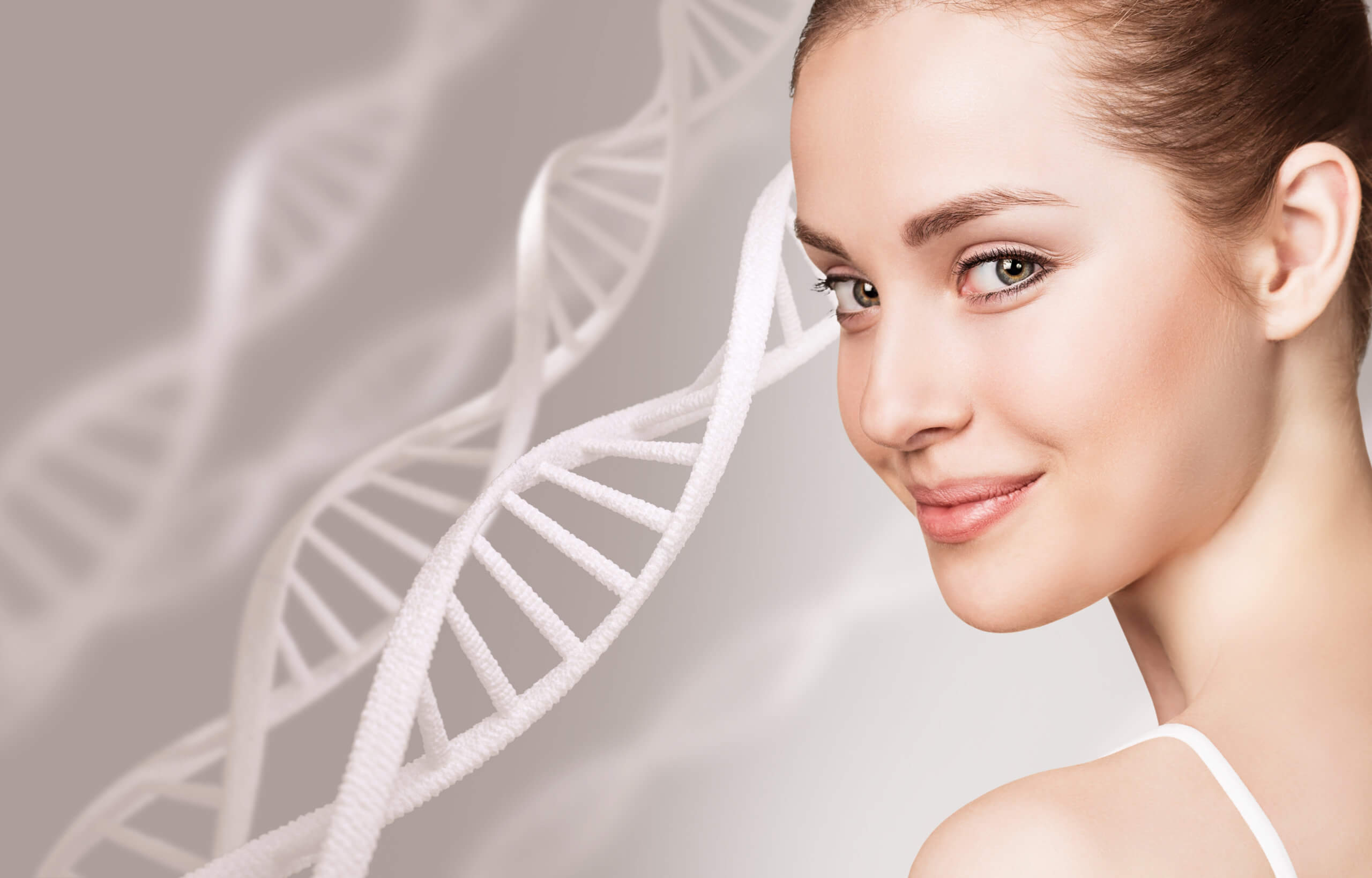
Antioxidants– Antioxidants in general are wonderful for your skin. They help to fight free radical damage that may cause your skin to look prematurely old and protect your skin from damage. (Specific ones, like astaxanthin, are also powerful when applied topically.)
Vitamin C– Vitamin C is a specific antioxidant that is at the top of the list for glowing skin. It majorly supports collagen synthesis, which means it can help boost levels of this important anti-aging skin protein.
Vitamin E– Another antioxidant, vitamin E helps keep skin nourished and hydrated. It also works with vitamin C to protect your skin from UV radiation and helps your skin look younger for longer.
Vitamin A– Vitamin A is often used to help manage acne. It can also help to diminish the appearance of fine lines and wrinkles by supporting collagen production.
Zinc– Zinc is an important mineral for healthy skin. It’s often used in acne treatment and for other inflammatory skin issues. Zinc also works with other vitamins to protect your skin from sun damage and assist collagen synthesis.
Omega 3 Fatty Acids– Omega 3s have many benefits, including moisturizing power and an ability to help protect your skin from UV damage. They may also reduce hyperpigmentation.
Top Foods for Skin Health
Avocados
Not that long ago, fatty foods were considered bad for your skin. And while certain types of fat can be harmful for health, your skin needs the right kind of fat to stay hydrated and supple.
Avocados contain the type of healthy fat (monounsaturated) that can help keep your skin elastic as you age. This fat also provides nourishment for your skin, making it particularly good for dry skin.
In addition, avocados are also an excellent source of vitamin E, a skin nutrient many people don’t get enough of. Just one avocado contains about 28% of the daily value (DV) of vitamin E, plus about 22% of the DV for vitamin C.
This is great because vitamin E and vitamin C work most effectively for your skin when combined.
Bell Peppers
Colored bell peppers (red, yellow, orange) are packed full of beta carotene, which is a plant pigment and precursor to vitamin A. After you eat it, your body converts beta carotene into vitamin A- the nutrient that can help diminish signs of aging.
Beta carotene is also an antioxidant that offers your skin extra protection against UV damage.
A single cup of red bell pepper gets you an impressive 156% of the DV for vitamin A. That same cup also has over 130% the DV of vitamin C, giving your skin an even greater boost.
Nuts (Particularly Walnuts & Almonds)
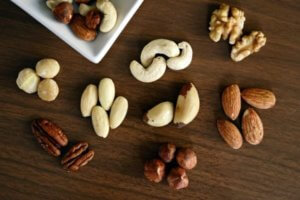 Nuts make great foods for skin health because they are filled with healthy, unsaturated fat (much like avocados).
Nuts make great foods for skin health because they are filled with healthy, unsaturated fat (much like avocados).
Walnuts are a particularly good choice because they contain a good amount of omega 3 and omega 6 fatty acids. Omega 6 doesn’t have quite as many skin benefits as omega 3, but it’s still a good unsaturated fat to consume- in the right amount.
What makes walnuts optimal is that they contain a very healthy ratio of omega 6 to omega 3- 4:1. One ounce of them also has 8% of the DV of zinc, which helps keep your skin barrier healthy.
Almonds are another good nut choice because they are rich in vitamin E. Eating one ounce of them gives you about 50% your DV of this skin vitamin and has been shown to increase vitamin E levels in blood cells.
Dark Chocolate (or Raw Cacao)
Dark chocolate (the kind that’s low on sugar and high on cocoa) is full of antioxidants that support glowing skin.
In fact, studies have found that eating dark chocolate regularly can have an anti-aging effect on your skin. This includes anti-inflammatory, photoprotective (protection from UV damage), and hydrating effects. Some research has even found a positive effect of cocoa on wrinkles and elasticity!
Overall, this is great news for chocolate lovers- just don’t overdo the sugar.
Tomatoes
Tomatoes are another good source of vitamin C, but they really shine for your skin because of another type of antioxidant: carotenoids.
Along with the powerful vitamin A precursor, beta carotene, tomatoes also contain lycopene and lutein. All three of these carotenoids have shown an ability to help protect your skin from sun damage. They may even be able to help prevent wrinkles as well.
Studies show that fat helps your body absorb more carotenoids. Try pairing tomatoes with a healthy fat source (avocados, for example) to help your skin even more.
Seeds (Especially Sunflower & Flax)
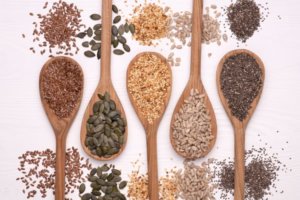 Like nuts, most seeds are full of healthy fats, which makes them excellent foods for skin health.
Like nuts, most seeds are full of healthy fats, which makes them excellent foods for skin health.
Sunflower seeds, in particular, contain protective fatty oils and also give you nearly 50% of the DV for vitamin E in a one ounce serving. They are rich in selenium (a good micronutrient for skin, hair, and nails) and zinc as well.
Flax seeds are also rich in healthy fats, especially omega 3 in the form of alpha linolenic acid (ALA). This may be why there’s indication that flaxseed oil can help with skin sensitivity, roughness, hydration, and smoothness when consumed regularly.
Certain Types of Fish
If you eat fish, certain types contain the right fatty acids for your skin. Salmon, herring, sardines, and mackerel are especially rich in skin-boosting omega 3. Eating them regularly can help keep your skin moisturized and protected from UV rays.
The same fish also provide your body with a good amount of vitamin E and zinc.
If you aren’t into fish, you can try an algae supplement instead to get vegan omega 3.
Green Tea and Matcha
Green tea is wonderful for your skin when used both inside and out. It’s full of powerful antioxidants, particularly one known as epigallocatechin-3-gallate (EGCG).
Like other antioxidant rich foods, green tea helps to protect your skin from sun damage when you drink it regularly. It can even reduce redness post sun exposure and may improve the moisture, thickness, texture, and elasticity of your skin.
Matcha- a more concentrated green tea- is also a great skin-boosting beverage.
Broccoli
Broccoli is full of several important vitamins and minerals that make it one of the top foods for skin health.
To start with, broccoli is particularly rich in vitamin C, vitamin A, and zinc, all of which are good for your skin. It also contains a good amount of lutein, the carotenoid that can help protect your skin from UV damage.
In addition, broccoli contains a powerful compound known as sulforaphane. Sulforaphane can help protect your skin from photoaging and may even offer protection against skin cancer. It may also help to maintain collagen levels, which is especially good for aging skin.
Chia Seeds
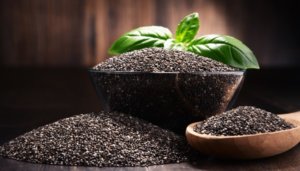 Chia seeds may be small but they are packed full of skin-boosting omega 3. In fact, chia is considered the best source of plant-based omega 3 fatty acids in the form of ALA. The seeds also contain smaller amounts of omega 6 and have a high antioxidant content.
Chia seeds may be small but they are packed full of skin-boosting omega 3. In fact, chia is considered the best source of plant-based omega 3 fatty acids in the form of ALA. The seeds also contain smaller amounts of omega 6 and have a high antioxidant content.
Even better, it’s very easy to add more chia to your diet. If you sprinkle it on top of food regularly, you can consume a good amount without even trying.
Red Grapes
Red grapes contain the powerful antioxidant known as resveratrol (the same one that’s in red wine).
Resveratrol has some outstanding benefits for your skin. It can slow skin aging by combating free radical damage and stimulating collagen production. It also helps protect your skin from UV damage and has a brightening effect.
To go along with resveratrol (which is concentrated in the skin and seeds), grapes also have a high water content. This helps keep your skin and whole body hydrated and healthy.
Leafy Greens
There are a lot of reasons to eat more leafy greens and being one of the best foods for skin health is one of them.
Many leafy greens contain a good amount of vitamin C as well as vitamin A (or technically beta carotene). They also provide a good supply of minerals, including zinc, as well as a variety of antioxidants. Some even have a good vitamin E content, which is a bonus for your skin.
If you want to know specific greens, it’s hard to go wrong with kale or spinach. Swiss chard is also a good choice as are beet greens, Romaine lettuce, and arugula.
Water
Although not technically a food, water is absolutely vital for your complexion. Every cell in your body needs water to function, and that includes skin cells. How often you hydrate your body has a major impact on how hydrated your skin is.
This is important because well-hydrated skin will keep its elasticity better. On the other hand, overly dry skin can show signs of aging more easily and also is more prone to irritation.
Fermented Foods
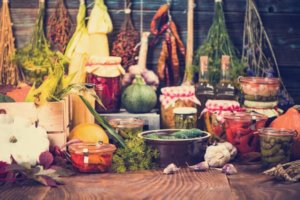 There’s a big connection between the health of your gut and the health of your skin. Being able to digest food well and having a healthy gut microbiome are both important for a glowing complexion.
There’s a big connection between the health of your gut and the health of your skin. Being able to digest food well and having a healthy gut microbiome are both important for a glowing complexion.
It shouldn’t come as any surprise, then, that probiotics play a big role in skin health. There’s evidence that they may help counteract UV damage, improve elasticity and hydration, decrease acne, and reduce inflammatory skin issues.
All of that is a pretty good reason to add more probiotic-rich foods to your diet! This includes sauerkraut, kimchi, miso, yogurt, kefir. tempeh, and kombucha.
High C Foods
While many nutrients contribute to the production of collagen, vitamin C is definitely at the top of the list. For this reason, foods that are high in vitamin C are particularly good for skin health.
Consuming more high C foods can help to brighten your complexion and slow or reverse signs of aging. Some of the top choices include:
- Citrus
- Kiwis
- Mangos
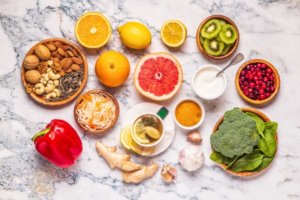
- Bell Peppers
- Tomatoes
- Papaya
- Broccoli
- Pineapple
- Guava
- Strawberries (& Other Berries)
- Currants
Yellow and Orange Veggies
Yellow and orange vegetables tend to be especially rich in carotenoids. (These are the antioxidants that help protect your skin from sun damage and can possibly slow signs of aging.)
Sweet potatoes, carrots, and pumpkin are three of the best examples (besides bell peppers and tomatoes, which we already mentioned). They are all rich in beta-carotene, which is converted by your body to vitamin A, and other carotenoids that defend your skin against damage.
Or to put it more simply…
Think in bright, warm colors when it comes to supporting your skin with food!
Foods to Avoid for Better Skin Health
Sometimes, what you don’t eat is just as important as what you do eat. In this case, certain foods have a track record of harming rather than helping your complexion. You don’t have to avoid eating them entirely, but cutting down on your consumption can help in a big way.
Processed and refined foods are almost a no brainer. These types of foods have most of the nutrients taken out of them and can’t really do much to help your skin.
Foods high in added salt and sugar won’t do great things for your skin, either. An overabundance of sugar can harm your gut health, which will eventually work its way to your skin. Eating too much salt can be very drying for your body- and this includes for your skin as well.
Overdoing caffeine or alcohol can also take a toll on your complexion. Again, normal amounts of either are fine, but an excess can dry out and deplete your skin.
Feeding Your Skin Inside and Out
The nutrients in the food you eat feed- or don’t feed- your skin. That’s why adding more skin-boosting foods to your diet can really give your complexion a boost and even help slow (or reverse) the aging process.
While you think about which foods you can start eating more of, don’t forget to also feed your skin from the outside! Antioxidant-packed skincare products deliver nourishment and powerful protection directly to your skin. Combining anti-aging skincare and a healthy diet is the best approach to keep your skin looking youthful for years to come.


